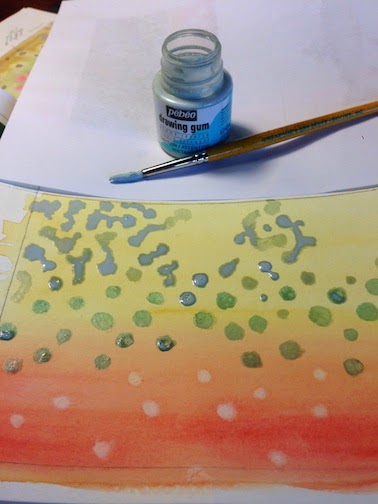I was satisfied with the Brown and Rainbow Trout patterns I had painted, but the Brook Trout pattern didn't look quite correct. After looking at several photos of Brook Trout I realized what fly fishers refer to as a "worm" pattern on the back and upper sides of the trout resembles patterns seen in some corals. Also the spots and vermiculate pattern were actually yellow, not white or light olive color which lifting the wet paint had created in previous paintings. To achieve the pattern seen on the fish in the photos I needed to use a different painting techniques then I had been using so far.
The first step was to lay down a blended wash of Aureolin Yellow across the top of the paper and Cadmium Red Light along the bottom. The colors join and mix just below the middle of the page. Before the paint dried I created several "white" spots in the middle and lower half of the painting by lifting off the wet paint. After the paint dried I added a little Winsor Blue to the "white" spots in the middle to create the halos for the red spots I would add later.
Next I used masking fluid to cover the blue spots in the middle. I then added additional masking to the upper part of the painting to create the "vermiculate and spot" pattern trout exhibit on their back and upper sides. In the photo to the left I had already covered the blue spots and was half way through adding additional masking to finish the trout's upper pattern.
Masking fluid creates a sharp edge where the pigment of the wash could not penetrate the paper. I softened these edges by adding clean water and lightly rubbing the edges. The step was to use Rose Madder to add small red spots in the center of the light blue spots. To the right is a photo of the finished painting.






